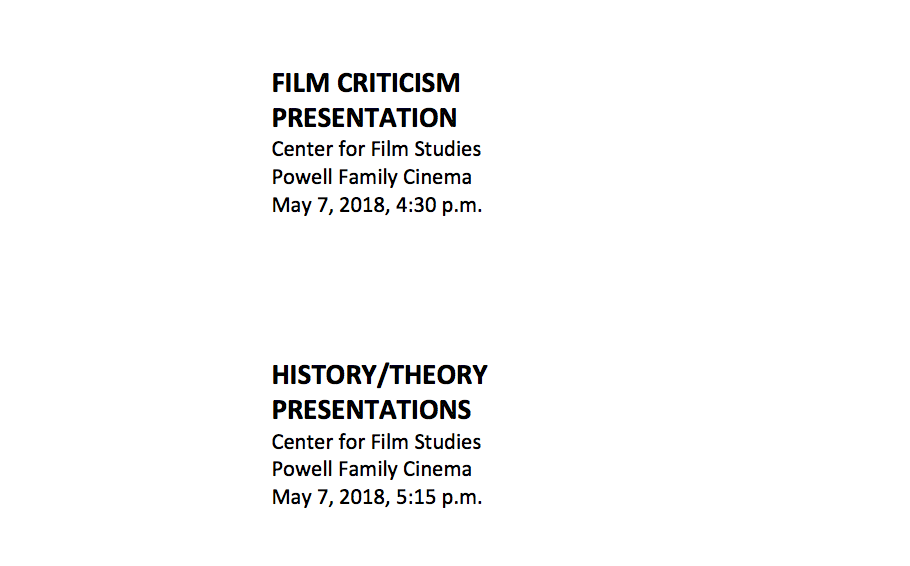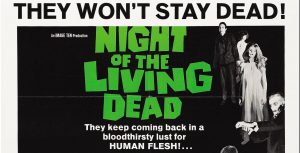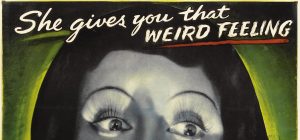
Monday saw our second round of thesis presentations– this time, the History/Theory and Criticism projects. The students and their work are featured below.
Criticism

Left: Advisor A.O Scott
Claire Shaffer, Emotion Pictures: The Art and Evolution of Music Videos
We often take music videos for granted. Over their 40-year history, music videos have provided the TV background noise in our living rooms, the fun YouTube clip we casually share with a friend, the meme we scroll past on our phones. They’ve also been cultural touchstones, viral sensations and, at times, groundbreaking pieces of visual art that add to the legacies of pop stars and filmmakers alike. This thesis pays critical attention to those moments, analyzing what makes the music video a uniquely expressive art form and how it has altered the landscape of digital media throughout its existence.
History and Theory

Left: Ari Polgar, Plot, Participation, and Playing Pretend: Narrative Pleasure in Single-Player Video Games
Long relegated to low-brow pop culture for teenagers, video games have emerged as the hot new area of media studies. With many styles and systems, games form a confusing group that is part technology and part toy. They are accepted for their fun but their power to connect with audiences and tell compelling tales is widely ignored. In this thesis, I argue for the merit of games as a storytelling medium, highlighting the ways in which interactivity supports plot while looking toward their future as an integrated narrative form, one that uses play and imagination to craft immersive stories.
Right: Graham Brown, Beyond the Infinite: A Genre Study of the Hypothetical Space Film
Since the dawn of cinema, outer space has both fascinated and challenged filmmakers. Though space has been a subject of film since A Trip to the Moon (1902), concerns of accuracy and realism didn’t enter popular cinema until Destination Moon (1950). This film laid the foundations for a genre I call the Hypothetical Space Film, a tradition fueled by a desire to distinguish itself from mainstream science fiction. In this thesis, I trace the development of the Hypothetical Space Film by analyzing the genre’s conventions and elements that filmmakers have interacted with for the last 68 years.
Not pictured: Paul Partridge, Did He Do It?: Judging the Suspect- Protagonist in True Crime Documentaries
The recent mainstream appeal of series such as Making a Murderer and The Jinx has cemented the place of true crime documentaries as a popular genre in our cultural landscape. Examining earlier works crucial to its formation reveals the common characteristic of creating a participative role for the viewer, who is asked to determine the guilt of the crime suspect around whom the narrative is centered. This thesis traces the history of how the true crime documentary came to be recognized as a genre, offers an overview of its main techniques and their evolution into long- form storytelling, and explores where the genre is headed now.
Congratulations to the thesis writers! Presentations conclude this Friday and Saturday with the digital and 16mm film screenings.





 Man is an observational documentary about a very unique moment in Indian politics, the rise of the Common Man Party (Aam Aadmi Party, AAP). It documents the early years of AAP, from the party’s inception as an anti-corruption movement, to its culmination as the ruling party in the state of New Delhi. This documentary is compelling for two reasons. First, it gives the viewer a singular and insightful glimpse into a unique democratic process; the formation of a political party from the grassroots level. Second, it very effectively utilizes the observational documentary form. The filmmakers Vinay Shukla and Khushboo Ranka filmed for over 400 hours with their unobtrusive DSLR camera to then crystallize that footage into a crisp 100 min narrative. Their documentary gives the audience an uninhibited and honest look into the emergence of AAP and reveals the machinations behind the political haze. Four years hence, the AAP has lost its idealism and devolved into just another political party. This time capsule of their incredible rise is euphoric nonetheless.
Man is an observational documentary about a very unique moment in Indian politics, the rise of the Common Man Party (Aam Aadmi Party, AAP). It documents the early years of AAP, from the party’s inception as an anti-corruption movement, to its culmination as the ruling party in the state of New Delhi. This documentary is compelling for two reasons. First, it gives the viewer a singular and insightful glimpse into a unique democratic process; the formation of a political party from the grassroots level. Second, it very effectively utilizes the observational documentary form. The filmmakers Vinay Shukla and Khushboo Ranka filmed for over 400 hours with their unobtrusive DSLR camera to then crystallize that footage into a crisp 100 min narrative. Their documentary gives the audience an uninhibited and honest look into the emergence of AAP and reveals the machinations behind the political haze. Four years hence, the AAP has lost its idealism and devolved into just another political party. This time capsule of their incredible rise is euphoric nonetheless.




